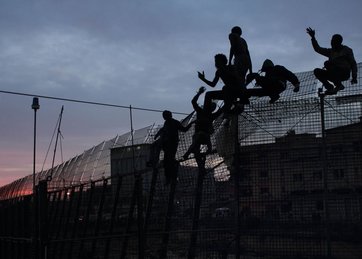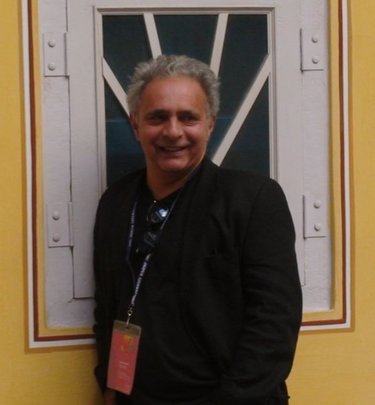|
Hanif Kureishi (Photo by Jose Varghese)  I have always wondered what really were the possibilities of the politically charged lyrics in the Cornershop song that goes, "Your life is so pristine, mine's like the Hanif Kureishi scene." Reading and experiencing his works in a specific order have helped me learn a bit about the themes that Kureishi generally explores, be it in his screenplays, novels, short stories, or occasional essays. But he is capable of giving surprises, and never fails to respond to the zeitgeist, which seems to change a few times every year these days. Perhaps, the Hanif Kureishi scene is not just about being in situations that are sexy, messy, racist, drug-dreamy, pissed off, impulsive and experimental, but more about learning to come out of all of them wiser, all in one piece, thanks to one’s creative abilities. However, his latest short story ‘Nowhere’, which has appeared in Zoetrope (Vol. 20, No. 4), ends with a deep sense of disappointment that arises from a new kind of displacement and alienation that could make certain people lose their identity and existence altogether. The theme addressed here is not entirely new. I had flashes of similar characters in my mind, though not in the same mental/intellectual mold, from the Margaret Atwood short story ‘Man from Mars’, the Stephen Frear’s movie Dirty Pretty Things (2002), the Abdulrazak Gurnah novel The Last Gift (2011), or a relatively recent J.M. Coetzee novel The Childhood of Jesus (2013). What makes ‘Nowhere’ a powerful work like these is the way it addresses an immediate socio-political issue – the contemporary refugee/immigration crises in this case – so directly, while Kureishi’s fictional craft and logic stays intact as ever. The first person narrative begins with a reference to the growing insignificance of the personal, or the significance of the general, among the identities of the dispossessed: “Call me Ezra. Call me Michael or Thomas. Call me Abu, Dedan, Ahmed. Call me Er or Asha. Call me whatever. You already have more than enough names for me.” In due course, the narrator is addressed as Asha by his close female friend Haaji. Asha’s dark skin makes him more undesirably visible in the great city where he takes refuge; but Haaji could pass off as ‘normal’, though their backgrounds are not very different. Asha keeps speaking proudly of owning a coffee shop in his town before his displacement. He is obsessed with books. Those were his most valuable possessions that he had to carry wherever he went, when he was faced with the reality that his life, as he had understood it to be in his country, had come to an end. The only choice he had was to flee. The books he had read and the ideas he loved to own give him an advantage of clearer perceptions of his predicament, over people who are otherwise similar to him in displacement: My town in my country was destroyed. I fled and travelled here to the land where the Enlightenment originated, to the democracy where I became a nigger overnight. The foreigner has been suspect from the beginning of time. But let us not forget: we are all potential foreigners. One day you too could be turned over from the white side of life to the black. It takes a moment. Others will notice you do not belong; they will fear you. His poet friend from the coffee shop, One-Arm, is with him in his escape route and they end up forging new, though legally suspect, identities in the city, working under Bain, “who secures empty houses and apartments in the great city.” Haaji works under Bain too, and she gets close to Asha, as she is drawn to his differences from the ‘others’ of their kind. Asha is the privileged among those who lost all their privileges in the process of their displacement. He hasn’t lost everything. He is able to read, and think. He can see his own situation in the light of thoughts from Kafka, Beckett, Pessoa, Hegel, Nietzsche, and Montaigne. Does it really make him any different in the end? That is perhaps the whole point of the story. Instead of leading him to any comfortable spot in his journey, the books he reads make him realize the horror of being nowhere. The irony could be that he is capable of relating his eerie existence to images from Beckett or Pessoa, while others could perhaps suffer a lot mindlessly. We have to figure out whether that leads him to anything better. There are more paradoxes, of how the refugees are subjected to an existence in crammed, claustrophobic spaces, while there are vast spaces in the empty houses they clean and maintain, as Bain’s labour hands. While people like Asha and Haaji face abject poverty and are reduced to live in closets, the posh spaces meant for inhabitation around them are kept deliberately empty by their owners who live, with their privileges, in other cities/countries for reasons of their own. Asha and Haaji are able to claim those houses momentarily, with their games of imagination. They realize the power of the here and now, and pretend to be the owners of those spaces while they can. Even while trapped in their closet, they revel in talking about democracy, love, dreams, gender, virtue, childhood, and racism. In a line that reminds one of Zadie Smith’s White Teeth, Asha realizes that he has no reflection in the new city. He is not recognized there. He comes to life only in Haaji’s eyes. When life deteriorates and he loses his last grip on life, Asha gifts Haaji his most precious possession, and lets her move on, allowing himself to be left behind. In his nowhere, Asha is able to let go of whatever was left with him, realizing that there are only certain things that can’t be taken away: One day everything will be borne away in a great fire, all the evil and all the good, and the names and the culture and churches. In the meantime there is this. I hand her my bag of books. They are inside me now. Let it go. In what could be interpreted as a Neitzschean nihilistic ending, there is just a glimmer of hope. Kureishi doesn’t give up on the power of intellect, imagination and creative energy that people could pass on to others. But a deep disappointment is visible as well, if one thinks of what is already lost despite all the powerful streams of literature, philosophy, arts, belief systems or culture could have saved or kept alive. But it doesn’t work that way, as we know. One would even have to look very deep into this story to find some traces of Kureishi’s trademark humour and playfulness. It would be a shame if a lot of us fail to find it among the general mess of a life in the big city he shows. Is the scene changing for the worse now? But I too just hope, against hope, something comes out of all this. Or, let’s just wait for our little planet to tumble into oblivion, as we, at the height of civilization, stare at our mobile phone screens for social media updates about certain crises around us. Reference: http://www.all-story.com/issues.cgi?action=show_story&story_id=575  Jose Varghese is a bilingual writer/editor/translator from India. He is the founder and chief editor of Lakeview International Journal of Literature and Arts. He has been working as the sole short fiction editor and curator for the magazine from early 2013, choosing hundreds of stories from a staggering amount of submissions. He is the author of the books Silver Painted Gandhi and Other Poems (2008) and "Silent Woman and Other Stories (forthcoming). His poems and short stories have appeared in journals/anthologies like The Salt Anthology of New Writing 2013, Unthology 5, The River Muse, Chandrabhaga, Kavya Bharati, Postcolonial Text , Dusun and Spilling Cocoa Over Martin Amis. He is a contributing writer for Panorama: The Journal of Intelligent Travel and is in the advisory board of Mascara Literary Review. He was the winner of The River Muse 2013 Spring Poetry Contest, a runner up in the Salt Flash Fiction Prize 2013, and a second prize winner in the Wordweavers Flash Fiction Prize 2012. He was shortlisted in Hourglass Short Story Contest and was commended in Gregory O'Donoghue International Poetry Prize 2014. He has done research in Post-Colonial Fiction and is currently working on his first novel. He writes for Thresholds: The International Short Story Forum, Chichester University, UK and was a participating writer at Hyderabad Literary Festival 2012 and the 2014 Vienna International Conference on the Short Story in English.
1 Comment
Noushar
3/27/2017 08:08:02 am
Sooper
Reply
Leave a Reply. |
StrandsFiction~Poetry~Translations~Reviews~Interviews~Visual Arts Archives
April 2024
Categories |

 RSS Feed
RSS Feed